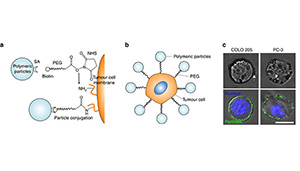 Researchers from the Massachusetts Institute of Technology have developed a way to amplify certain types of cancer treatment by tethering nanoparticles to cancerous tumor cells. The team’s work was published in Nature Communications.
Researchers from the Massachusetts Institute of Technology have developed a way to amplify certain types of cancer treatment by tethering nanoparticles to cancerous tumor cells. The team’s work was published in Nature Communications.
The researchers found that tethered nanoparticles increase the forces exerted on the cells by phenomena such as blood flow, therefore making the cells more vulnerable to a drug that triggers cell death.
“When you attach many particles to the membranes of these cells, and then expose them to forces that mimic those in the human body, like blood flow, these therapeutics become more effective. It’s a way of amplifying the forces on the cells using polymeric materials,” lead author Michael Mitchell said in prepared remarks.
In a preclinical mouse model, the tethered nanoparticles made the cell-death-inducing drug 50% more effective, according to the researchers, and the combination therapy killed up to 90% of tumor cells.
The team focused on an experimental drug, TRAIL, which acts on receptors found on cell membranes and sends them a signal to stimulate cell death.
They found that tumor cells become more vulnerable to the drug after being exposed to forces from physiological fluids, like blood flow.
“Under these flow conditions, more tumor cells began to die in the presence of the therapeutic,” Mitchell said.
These results led the researchers to believe that they could amplify the cells’ vulnerability by tethering nanoparticles to cell membranes and therefore increase the forces acting on them.
The particles were made of PLGA polymers and coated with another polymer, PEG. The polymer coating was tagged with an antibody specific to proteins found on tumor cell surfaces.
When they tested their combination therapy in mice, the researchers found that it killed metastatic tumor cells in the bloodstream and also reduced the progression of solid tumors.
They concluded that the largest particles were most effective and as greater numbers of particles were tethered to the surface, more cells died.
“When you expose cells to forces and then these particles are coming down on the cell, they could be flattening all these molecules on the surface. Then the receptor can come in better contact with TRAIL to induce tumor cell death,” Mitchell said. “We’re very interested in combined approaches where you can hit tumor cells with many immune-based therapies and then exploit physical forces that these cells are exposed to, as a new way to kill them.”

